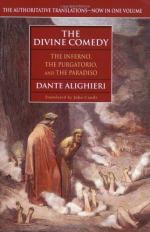He answering thus: “By thee conducted first,
I enter’d the Parnassian grots, and quaff’d
Of the clear spring; illumin’d first by thee
Open’d mine eyes to God. Thou didst, as
one,
Who, journeying through the darkness, hears a light
Behind, that profits not himself, but makes
His followers wise, when thou exclaimedst, ’Lo!
A renovated world! Justice return’d!
Times of primeval innocence restor’d!
And a new race descended from above!’
Poet and Christian both to thee I owed.
That thou mayst mark more clearly what I trace,
My hand shall stretch forth to inform the lines
With livelier colouring. Soon o’er all
the world,
By messengers from heav’n, the true belief
Teem’d now prolific, and that word of thine
Accordant, to the new instructors chim’d.
Induc’d by which agreement, I was wont
Resort to them; and soon their sanctity
So won upon me, that, Domitian’s rage
Pursuing them, I mix’d my tears with theirs,
And, while on earth I stay’d, still succour’d
them;
And their most righteous customs made me scorn
All sects besides. Before I led the Greeks
In tuneful fiction, to the streams of Thebes,
I was baptiz’d; but secretly, through fear,
Remain’d a Christian, and conform’d long
time
To Pagan rites. Five centuries and more,
T for that lukewarmness was fain to pace
Round the fourth circle. Thou then, who hast
rais’d
The covering, which did hide such blessing from me,
Whilst much of this ascent is yet to climb,
Say, if thou know, where our old Terence bides,
Caecilius, Plautus, Varro: if condemn’d
They dwell, and in what province of the deep.”
“These,” said my guide, “with Persius
and myself,
And others many more, are with that Greek,
Of mortals, the most cherish’d by the Nine,
In the first ward of darkness. There ofttimes
We of that mount hold converse, on whose top
For aye our nurses live. We have the bard
Of Pella, and the Teian, Agatho,
Simonides, and many a Grecian else
Ingarlanded with laurel. Of thy train
Antigone is there, Deiphile,
Argia, and as sorrowful as erst
Ismene, and who show’d Langia’s wave:
Deidamia with her sisters there,
And blind Tiresias’ daughter, and the bride
Sea-born of Peleus.” Either poet now
Was silent, and no longer by th’ ascent
Or the steep walls obstructed, round them cast
Inquiring eyes. Four handmaids of the day
Had finish’d now their office, and the fifth
Was at the chariot-beam, directing still
Its balmy point aloof, when thus my guide:
“Methinks, it well behooves us to the brink
Bend the right shoulder’ circuiting the mount,
As we have ever us’d.” So custom
there
Was usher to the road, the which we chose
Less doubtful, as that worthy shade complied.




